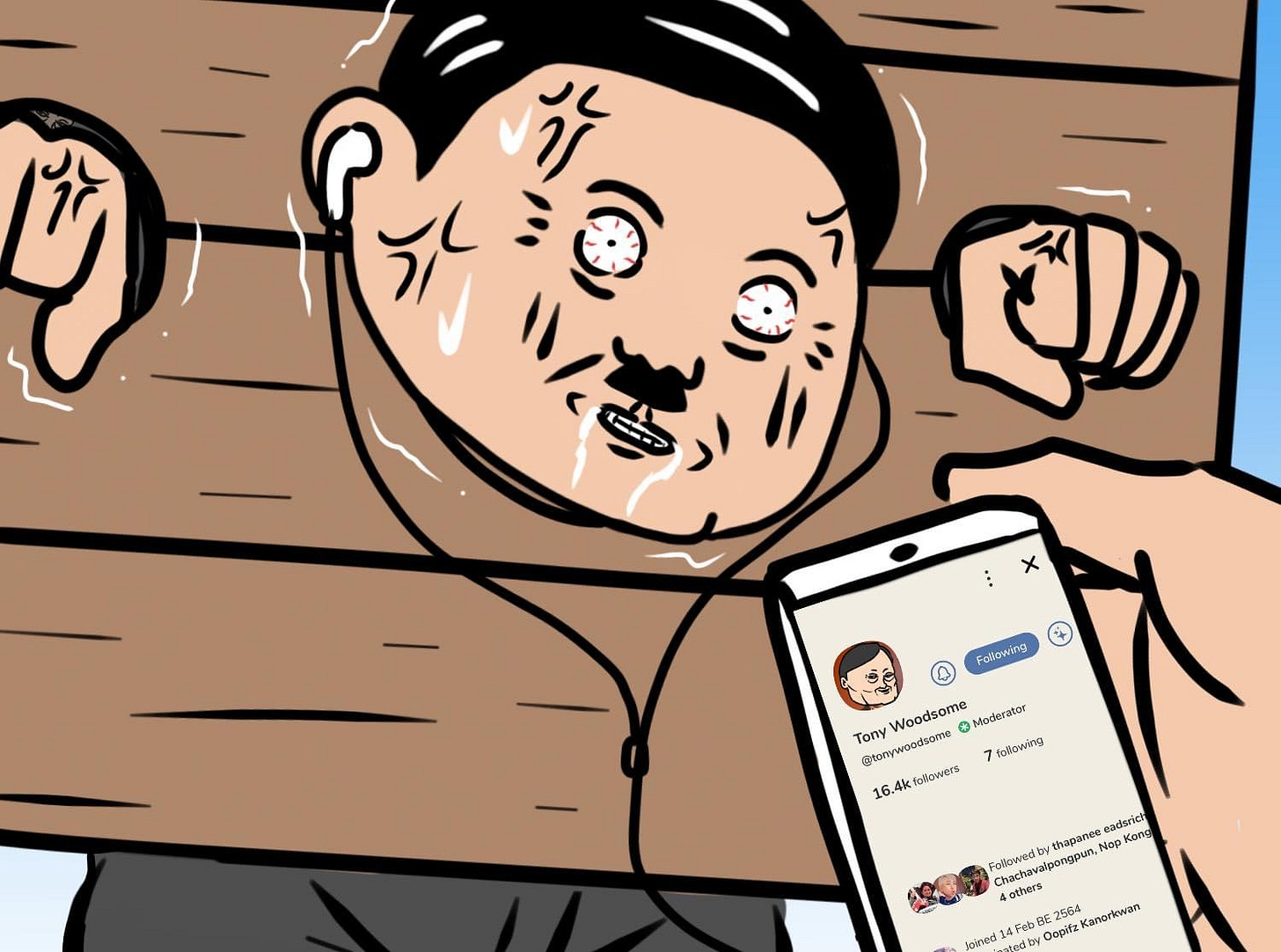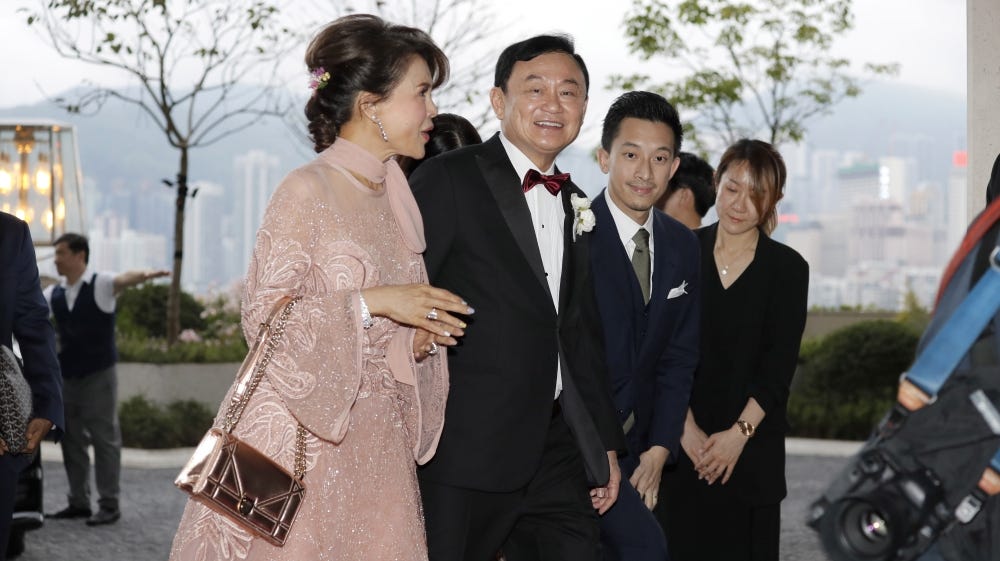The plot that nearly toppled Prayut
Thailand's prime minister was shocked when one of his closest comrades tried — and failed — to stab him in the back. Here's the inside story of what happened, and why, and what comes next.
“My fist is big, so is my heart,” boasted Prayut Chan-ocha, beating his chest with pride, as he swaggered out of parliament on September 4 after comfortably surviving a vote of no-confidence. “My morale is also high.”
But behind his bravado, Thailand’s prime minister was reeling from a stunning blow to his authority. He had been blindsided by a plot that came close to toppling him, forcing him to make humiliating promises and hand out large bribes to salvage his premiership.
Just a week earlier he’d been so disconsolate and desperate that he sent a forlorn message via the LINE app on his mobile phone to his old friend Prawit Wongsuwan, plaintively asking: “Why aren’t those MPs supporting me? What did I do wrong? I am working so hard.”
But as Prayut already knew by then, Prawit was actually behind the plot, lurking in the shadows as his henchman Thamanat Prompow schemed to engineer the parliamentary arithmetic that would remove the prime minister.
Prayut was devastated that his “big brother” Prawit, who he had followed faithfully through half a century of military service and political struggles, was planning to betray him. In a further twist of the knife, Prawit was conspiring with Prayut’s nemesis Thaksin Shinawatra.
Prayut launched a desperate battle to save himself. For a few days it looked like he was doomed. But then suddenly the plot imploded, and the previously teflon-coated Thamanat, who had managed to ascend to a remarkably powerful position in Thai politics despite several spectacular scandals, was booted out of the government.
It’s been a tumultuous month in Thai politics.
Here is the inside story of what happened, and why, and what it means for the future.
It’s based on information from dozens of confidential sources, and also draws on the work of several excellent journalists in Thailand whose articles are hyperlinked throughout.
A key clue that something big was brewing in the murky waters of Thai politics was when Tony Woodsome said he was coming home.
Thaksin Shinawatra signed up to the Clubhouse audio chat app in February using this unusual alias and has been holding wildly popular discussion sessions twice a month in which he regularly goads Prayut by making disingenuous faux-sincere offers to use his expertise and international connections to assist the government’s flailing efforts to cope with the coronavirus pandemic.
Prayut is enraged by Thaksin’s ability to talk to Thais directly via Clubhouse. He angrily refused to join it himself, declaring “I don’t have time for the app and will not download it”, although he clearly does have time to provide content for his social media team to share on Facebook, Twitter and even TikTok.
After Thaksin piously offered to contact world leaders to help secure more vaccine doses for Thailand during a Clubhouse session in April, Prayut exploded when reporters asked him about it. As usual he didn’t even want to say Thaksin’s name — he can’t bear to utter it or hear it mentioned.
“I won't answer. Don't relay a question from someone who is not in the country,” he fumed. “I don't know him. Just leave him be.”
Prayut’s fury at Thaksin’s talks on Clubhouse has been regularly mocked by the political cartoonist Kai Maew.
Tony’s session on Clubhouse on July 13 was particularly provocative because he made a remarkable claim that stunned Thais and sparked a sensation on social media.
“I definitely am returning,” he declared. “I will say when later. And, for sure, I am going through the front door, not the back door.”
His comments set Twitter ablaze, with the hashtag #พี่โทนี่กลับไทยแน่ — #TonyDefinitelyComingBackToThailand — tweeted more than half a million times over the next few days.
Thaksin is miserable living in exile and his dearest wish is to return to Thailand and have his reputation rehabilitated before he dies.
Ever since he fled the country in 2008 he has been trying to find a way home. His relentless efforts to pressure the royalist elite to accept him back have been a major theme in the kingdom’s political drama for more than a decade.
Thaksin has done more than almost anybody else to ignite a political awakening among Thais, but he did it mostly by accident.
He’s not particularly committed to democracy — he just likes elections because he always tends to win them — and he craves the respect of the royals. But in his struggles against the old elite he unleashed powerful forces he couldn't control. For the first time in history, millions of Thais realised that real democracy would improve their lives and the monarchy was not on their side.
When Thaksin encouraged huge protests in Bangkok and Pattaya in 2009 and the extraordinary Red Shirt occupation of central Bangkok in 2010, he did it purely out of self-interest, but these events were nevertheless important milestones in Thailand’s tortuous journey towards democracy. He created and funded the Red Shirts just to give himself more leverage in his negotiations and to counter the Yellow Shirts, but they developed into a genuine pro-democracy mass movement that changed the kingdom forever.
Thaksin has always had a tendency to make rash decisions, and he’s so desperate to get home that he has repeatedly blundered into disasters by rushing ahead with reckless schemes before thinking them through.
His insistence on getting parliament to pass a controversial amnesty bill in 2013, when even his sister Yingluck who was his proxy prime minister at the time thought it was ill-advised and far too soon, gave the royalists the pretext they were looking for to stir up mass protests and seize back power in the 2014 coup.
He hatched an audacious plan in 2019 to enlist Vajiralongkorn’s older sister Ubolratana as the prime ministerial candidate of one of his political parties, which he thought would ensure a thumping election victory and rapprochement with the rest of the royals. But within hours of Ubolratana’s candidacy being officially submitted, the king shot the whole scheme down with an angry statement from Bavaria.
During his political ascent, Thaksin invested considerable funds and effort into trying to build a rapport with Vajiralongkorn. He made huge donations during a period when Vajiralongkorn was constantly short of cash because Bhumibol was trying to restrict his income in a doomed attempt to discipline his son. For years he was regarded as a key ally of the future king.
But around the time of the 2006 coup, Vajiralongkorn and Thaksin had a “spectacular falling-out” according to a leaked US cable. Thaksin has been continually trying to reestablish the relationship ever since but has been repeatedly rebuffed.
By the middle of this year, Thaksin was running out of cards to play. His chats on Clubhouse were hugely popular, but his brand was losing its lustre. Most younger Thais who want democracy view him as a dinosaur, a relic of the corrupt old system they want to reform.
His latest political vehicle, the Pheu Thai Party, is slowly but surely decomposing, and the stench of failure hangs over it. It has no coherent ideology and only really exists to give Thaksin leverage to strike a deal to rehabilitate himself.
Thailand’s absurdly undemocratic constitution means Pheu Thai faces the prospect of being locked out of power forever, so its MPs are starting to jump ship to other parties, and many of its most capable leaders, like Sudarat Keyuraphan and Chatchart Sitthiphan, have left.
But one of Thaksin’s biggest strengths is that he never gives up. No matter how many times his rash schemes unravel and he gets knocked down, he picks himself up and tries again. He has never stopped believing that he can find a way to come home.
Thaksin has a long history of making grandiose promises that turn to dust when exposed to reality, but his boast that he would be coming back to Thailand through the front door was not entirely unfounded.
Behind the scenes, he was talking to an old adversary about striking a grand political bargain that would snatch victory from the jaws of defeat.





